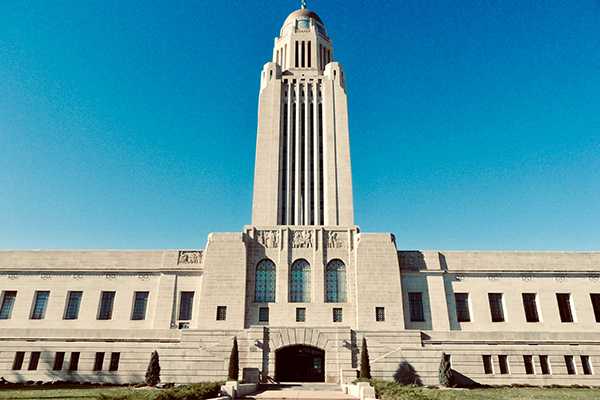
Nebraska leaders have taken the first steps to identify and advance urgently needed reforms to the state’s justice system through the Justice Reinvestment Initiative (JRI).
A bipartisan group of state leaders launched the JRI process in 2021, seeking to address surging growth in the state’s prison population that has strained justice system resources to the breaking point. Nebraska’s prison system is the second most overcrowded system in the country, with state correctional facilities at 115% of their operational capacity and six out of 10 prisons exceeding 120% of capacity. Simultaneously, Nebraska’s corrections spending has increased over 51% since 2011, and the state faces a $230 million bill to build a new prison absent major reforms.
The Nebraska Criminal Justice Reinvestment Working Group was led by Judiciary Committee Chairman Steve Lathrop, Governor Pete Ricketts, and Chief Justice Michael Heavican, and brought together criminal justice leaders from across the state for six months of rigorous analysis and discussion. The Crime and Justice Institute, with funding from the Department of Justice Office of Justice Programs’ Bureau of Justice Assistance (BJA) and The Pew Charitable Trusts, assisted state leaders in analyzing corrections data, assessing decision-making throughout the justice system, and developing recommendations for policy and practice changes.
In January 2022, the Nebraska Criminal Justice Reinvestment Working Group released a final report laying out key findings on the state’s justice system, along with policy options to address the various challenges. The policy recommendations were translated into a comprehensive, legislative reform package, LB 920. The bill ultimately stalled during the 2022 legislative session, but the Working Group’s identification of crucial challenges and evidence-based solutions lays a foundation for future justice reform efforts.
Key findings from the Working Group include:
- Nebraska is one of just four states in the nation with a higher incarceration rate now than in 2010;
- Nebraska’s prison population grew 21% since 2011 and its incarceration rate increased 17%, while the national rate steadily decreased;
- Time spent in prison increased 38% over the last decade, and parole grant rates decreased 20 percentage points;
- One in three Nebraskans end up back in prison within three years;
- Black, Hispanic, and Native Americans are overrepresented in Nebraska prison admissions, with the disparity being most pronounced for Black individuals, who made up 5% of Nebraska’s population but 22% of prison admissions in 2020;
- Admissions to prison of Native Americans increased 9% over the last decade compared to declining rates for all other racial groups; and
- Law enforcement agencies are now the primary intervention for individuals experiencing a behavioral health crisis, and officers reported having no other option but to “[treat] patients like prisoners” due to limited treatment resources and interventions.
The group came to consensus on 17 policy recommendations that:
- Focus corrections resources on violent offenses and individuals at high risk of reoffending;
- Address regional inconsistency in sentencing outcomes across the state;
- Minimize barriers to successful reentry;
- Improve statewide behavioral health supports; and
- Ensure the sustainability of reforms.
Central to this effort were engaging with and getting input from multiple stakeholder groups, including law enforcement, victims, behavioral health providers, and directly impacted people. This outreach process developed connections with and between diverse stakeholders who are now working together on justice reform.
Despite these first steps, Nebraska’s prison population continues to grow and further stress already overcrowded facilities, and the state faces hundreds of millions of dollars in correctional spending to build a new facility. In the coming years, Nebraska leaders have a critical opportunity to bring these initial achievements to the next level by adopting and implementing the comprehensive recommendations of the Working Group.
Read the Nebraska Criminal Justice Reinvestment Working Group’s final report here.
This project was supported by Grant No. 2015-ZB-BX-K002 awarded by the Bureau of Justice Assistance. The Bureau of Justice Assistance is a component of the Department of Justice’s Office of Justice Programs, which also includes the Bureau of Justice Statistics, the National Institute of Justice, the Office of Juvenile Justice and Delinquency Prevention, the Office for Victims of Crime, and the SMART Office. Points of view or opinions in this document are those of the author and do not necessarily represent the official position or policies of the U.S. Department of Justice.